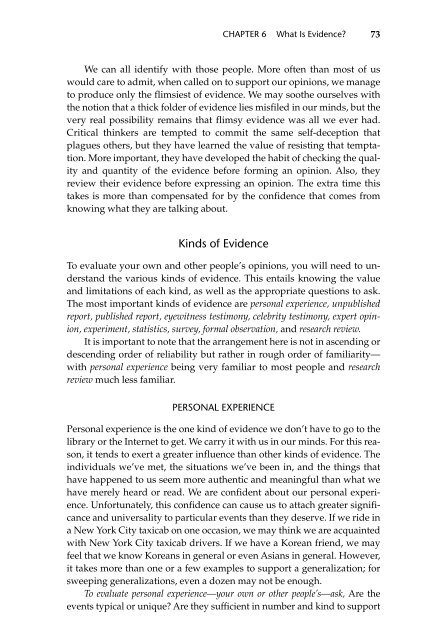Beyond Feelings
Beyond Feelings
Beyond Feelings
Create successful ePaper yourself
Turn your PDF publications into a flip-book with our unique Google optimized e-Paper software.
CHAPTER 6 What Is Evidence?<br />
We can all identify with those people. More often than most of us<br />
would care to admit, when called on to support our opinions, we manage<br />
to produce only the flimsiest of evidence. We may soothe ourselves with<br />
the notion that a thick folder of evidence lies misfiled in our minds, but the<br />
very real possibility remains that flimsy evidence was all we ever had.<br />
Critical thinkers are tempted to commit the same self-deception that<br />
plagues others, but they have learned the value of resisting that temptation.<br />
More important, they have developed the habit of checking the quality<br />
and quantity of the evidence before forming an opinion. Also, they<br />
review their evidence before expressing an opinion. The extra time this<br />
takes is more than compensated for by the confidence that comes from<br />
knowing what they are talking about.<br />
Kinds of Evidence<br />
To evaluate your own and other people’s opinions, you will need to understand<br />
the various kinds of evidence. This entails knowing the value<br />
and limitations of each kind, as well as the appropriate questions to ask.<br />
The most important kinds of evidence are personal experience, unpublished<br />
report, published report, eyewitness testimony, celebrity testimony, expert opinion,<br />
experiment, statistics, survey, formal observation, and research review.<br />
It is important to note that the arrangement here is not in ascending or<br />
descending order of reliability but rather in rough order of familiarity—<br />
with personal experience being very familiar to most people and research<br />
review much less familiar.<br />
PERSONAL EXPERIENCE<br />
Personal experience is the one kind of evidence we don’t have to go to the<br />
library or the Internet to get. We carry it with us in our minds. For this reason,<br />
it tends to exert a greater influence than other kinds of evidence. The<br />
individuals we’ve met, the situations we’ve been in, and the things that<br />
have happened to us seem more authentic and meaningful than what we<br />
have merely heard or read. We are confident about our personal experience.<br />
Unfortunately, this confidence can cause us to attach greater significance<br />
and universality to particular events than they deserve. If we ride in<br />
a New York City taxicab on one occasion, we may think we are acquainted<br />
with New York City taxicab drivers. If we have a Korean friend, we may<br />
feel that we know Koreans in general or even Asians in general. However,<br />
it takes more than one or a few examples to support a generalization; for<br />
sweeping generalizations, even a dozen may not be enough.<br />
To evaluate personal experience—your own or other people’s—ask, Are the<br />
events typical or unique? Are they sufficient in number and kind to support<br />
73


